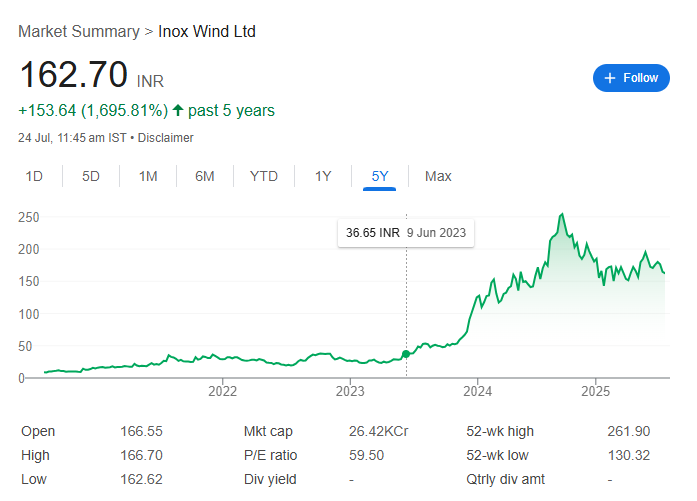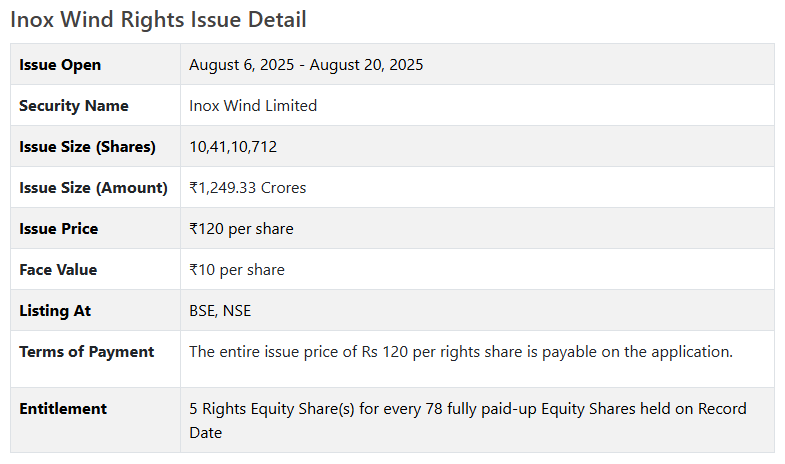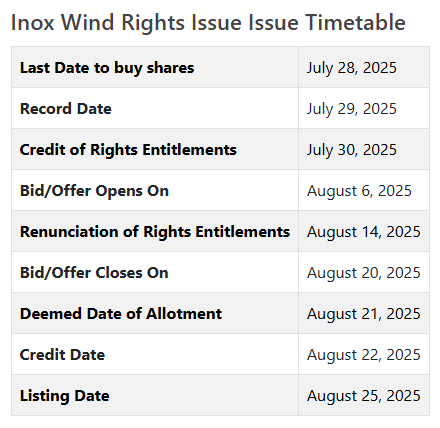
A significant corporate action is unfolding in India's high-growth renewable energy sector, demanding immediate investor attention. The Inox Wind share price has been in focus following the company's major announcement of a Rights Issue to raise nearly ₹1,249.33 Crores. opens on August 6. When a company offers its stock at a substantial discount, it can trigger both excitement and apprehension. Is it a signal of underlying financial weakness, or is it a strategic move to fuel aggressive growth?

1. The Offer Deconstructed: Understanding the Terms
A rights issue is a mechanism for a company to raise capital from its existing shareholders by offering them new shares at a preferential price. Understanding the precise terms is the first step in any analysis.
Based on the company's official Letter of Offer, here are the critical details of the Inox Wind rights issue:
- Issue Size: The company aims to raise up to ₹1,249.33 Crores by issuing over 104 million new equity shares. This is a significant capital injection.
- Issue Price: The new shares are offered at ₹120 per share. Our desk notes that this represents a compelling discount of approximately 27% compared to the closing price of ₹165.60 on the day prior to the detailed announcement.
- Rights Ratio: The entitlement is structured as 5 new equity shares for every 78 fully paid-up shares held by an investor.
- Record Date: The cut-off date to determine shareholder eligibility was Tuesday, July 29, 2025. If you held Inox Wind shares in your Demat account on this date, you are eligible to participate.
- Subscription Period: The window for eligible investors to apply for these rights shares opens on August 6, 2025, and will close on August 20, 2025. This is a critical timeline to monitor.

2. The Strategic Rationale Behind the Fundraise
The central question for our team was: Why is Inox Wind raising over a thousand crores at this specific juncture? Our analysis indicates this is not a distress call but a calculated, forward-looking strategy rooted in three key factors:
A. Fortifying the Balance Sheet:
The primary stated objective is to strengthen the company's capital structure. Inox Wind recently concluded a merger with Inox Wind Energy, a move designed to deleverage its balance sheet significantly. This rights issue acts as the next logical step, injecting fresh equity to further reduce debt, improve debt-to-equity ratios, and provide a robust financial foundation for future operations. A stronger balance sheet lowers financial risk and enhances the company's ability to secure favorable terms for future projects.
B. Fuelling the Growth Engine:
The Indian renewable energy sector is experiencing unprecedented tailwinds, driven by government policy and a global shift towards green energy. Inox Wind is not merely a passive participant; it is an aggressive player. The company boasts a formidable order book of over 3 Gigawatts, providing strong revenue visibility. The capital raised will be crucial in executing these orders efficiently, investing in technological upgrades, and potentially expanding manufacturing capacity to capture an even larger market share.
C. Capitalizing on Strong Performance:
The timing of this issue is noteworthy. It follows a period of record-breaking performance for the company, including its highest-ever quarterly profits in Q4 FY25 and a doubling of revenue year-over-year. Management is likely capitalizing on this positive momentum and investor confidence to raise growth capital under favorable conditions. It’s a classic move of raising funds from a position of strength, not weakness.

3. Potential Impact on Shareholder Value: The Dilution vs. Growth Equation
Any issuance of new shares leads to equity dilution, meaning the company's net profit is now divided among a larger number of shares. This can temporarily suppress the Earnings Per Share (EPS). However, a purely mechanical view of dilution is shortsighted. The true impact on the inox wind share must be weighed against the potential for future value creation.
- Short-Term View (The Dilution Effect): In the immediate term, the increased share count can create a price overhang. The adjusted market price post-issue will mathematically be lower than the pre-issue price. Some investors may exit, fearing the EPS dilution.
- Long-Term View (The Growth Accretion): Our desk believes the long-term perspective is more relevant here. The critical question is whether the Return on Capital Employed (ROCE) from the newly infused ₹1,249 crores will be greater than the company's cost of capital. Given the strong order book and industry tailwinds, if Inox Wind successfully deploys these funds to generate higher revenues and profits, the resulting growth in the overall business value will far outpace the initial dilution effect. This is the thesis long-term investors should focus on.
4. Your Strategic Options: A Guide for Eligible Shareholders
As an eligible shareholder, you have a time-sensitive decision to make regarding your Rights Entitlements (REs), which will be credited to your Demat account. Doing nothing is not a viable strategy as it guarantees value destruction through dilution.
Our team has outlined the three strategic paths available:
Strategy 1: Subscribe (Exercise Your Rights)
- Action: Apply for your allotted shares by paying the issue price of ₹120 per share.
- Rationale: This is the recommended path if your own research aligns with our bullish long-term outlook on the company and the sector. It allows you to average down your cost of acquisition and increase your stake in a potential growth story at a discounted valuation.
Strategy 2: Renounce (Sell Your Rights Entitlements)
- Action: Sell your REs on the stock exchange during the specified trading window.
- Rationale: If you do not wish to invest additional capital but want to be compensated for the dilution of your existing holding, this is the optimal choice. The price at which your REs sell represents the value of the "right," which you can monetize.
Strategy 3: Let Your Rights Lapse
- Action: Take no action.
- Our View: This is strongly discouraged. Your REs will expire worthless, and you will receive no financial benefit. Meanwhile, your percentage ownership in the company will decrease, and you will bear the full brunt of the dilution effect on the share price without any compensation.
The GoPocket Execution Edge
Analyzing a corporate action is one thing; acting on it efficiently is another. Executing your chosen strategy—whether it's applying for the rights issue online or seamlessly trading your Rights Entitlements on the market—requires a fast, intuitive, and reliable platform.
A GoPocket Demat account is engineered to handle such time-sensitive investment decisions. Our platform provides the tools to monitor your portfolio, option to invest your favorite stocks , ensuring you can translate research insights into timely action without friction.

"Investments in securities market are subject to market risks. Read all the related documents carefully before investing."
What's Trending
September 11, 2025
June 6, 2025
Recent Blog
Open Your Demat Account in Under 5 Minutes
Have any queries? Get support
Blog
Recent Blogs

Open your GoPocket Account within 5 minutes.
Have any queries?







.jpeg)

.jpeg)





